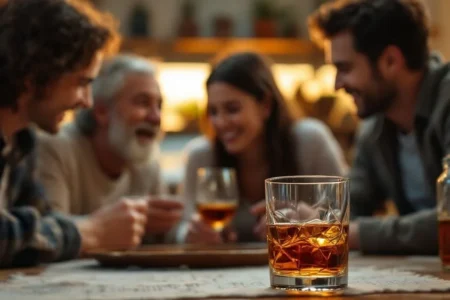How to Deal with Hangover Anxiety
- Updated on: Apr 24, 2025
- 5 min Read
- Published on Apr 24, 2025

Hangover anxiety, often referred to as “hangxiety”, is a collective experience for many people after a night of drinking. Hangover anxiety typically comes with the emotional/psychological feelings of dread, worry, or panic in conjunction with the physical symptoms of a hangover. Managing feelings of anxiety will help you recover sooner, as well as improve your overall sense of well-being. This article will discuss the causes of hangover anxiety and ways to cope with it.
Understanding Hangover Anxiety
To begin with, to effectively deal with hangover anxiety, we first need to understand what hangover anxiety is and why it occurs, as hangover anxiety is not just feeling bad after you drink, it has both physical symptoms and psychological symptoms working together.
The Physical Effects of Alcohol
Alcohol is a depressant, and it affects the central nervous system. Consumed in excess, alcohol causes dehydration, loss of electrolyte balance AND interrupts sleep. These factors can also possibly contribute to the feelings of anxiety and unease felt the following day. You could also possibly increase your body’s anxiety level because of its reaction to alcohol withdrawal and that can make your emotional hangover harder to deal with on top of the physical hangover. The inflammation alcohol also causes physiologically to your body can make you feel fuzzy and uncomfortable, AND contribute to anxiety.
A combination of a punishing headache, nausea, and fatigue can create a perfect environment for anxiety to flourish, creating a sensation of being overwhelmed and out of control.
The Psychological Component
In addition to the physical symptoms, alcohol can also take a toll on mental health. Many people suffer from anxiety because the next-day embarrassment of their actions while being drunk can lead to feelings of regret and shame. The emotional aspect of understanding last night’s events can lead to next-level anxiety, especially in light of social media, where people can revisit their night in pictures or posts, and it can increase their feelings of embarrassment and self-doubt. Worrying about what others might think is hard to shake off and creates a bubble of negative emotion. Equally, the societal pressures that surround drinking can create a spiral of anxiety where individuals feel they have to drink in social situations and are left dealing with the consequences of that drinking the next day. So not only are these individuals dealing with anxiety during hangovers, but they also have to get through the anxiety of the next social event.
Recognizing the Symptoms
Recognizing hangover anxiety is important so that it can be managed effectively. The physical symptoms from alcohol consumption like headaches, nausea, and fatigue are easy to identify, but the psychological symptoms, like the level of anxiety or worry you may be going through, can be more difficult to pinpoint. These mental effects can be easily ignored and people would likely tend to blame the way they feel solely on the physical hangover symptoms related to alcohol.
Common Symptoms of Hangover Anxiety
Some of the symptoms that people experience can include:
- Increased heart rate
- Restless / Irritable
- Dread / Panic
- Can’t concentrate
- Overanalyzing past thoughts or conversations
If you recognize these symptoms in you or in someone else, knowing they exist allows you to take a more proactive approach to managing anxiety and getting back to some kind of normalcy in recovery. It’s worth remembering that these types of feelings often accompany some form of physical discomfort, and old fashioned emotional pain compounded by social ramifications of drinking. Many people may suffer from anxiety due to other-factor judgments by their friends, relatives or colleagues, as well as weighing up the negative consequences of their behavior while intoxicated.
It is also interesting to note the psychological hangover can carry on long after the physical symptoms or hangover; people will mentally relieve a lot of what happened on a night out, and subconsciously beat themselves up. Anxiety can build from trigger events, physical discomfort, or reliving negative experiences on autopilot. The human mind has a long term memory and combined with alcohol can make the hangover experience that much worse. Once the anxiety loops build it becomes hard to break this negative cycle. Anxiety then compounds any potential recovery in the form of troubling a person’s physical symptoms.Recognizing this relationship between mind and body is key in the creation of practical coping strategies (for example, engaging in mindfulness practices and even doing light exercise) that help to reduce cognitive and physiological sensations associated with hangover anxiety.
Practical Strategies for Coping
There are many different coping strategies that can be used to address hangover anxiety effectively. These approaches can address some of the physical and relate to sensory symptoms of hangover anxiety to help you be more comfortable in using a recovery method or combination of coping strategies.
Hydration and Nutrition
The first step towards recovering from a hangover is to rehydrate your body. Many drinks contain diuretics. Dehydration can worsen sensations of anxiety. Drinking water, herbal teas, or drinks with electrolyte replenishment may help you restore homeostasis. Eating a healthy meal may provide your body nutrients that you consumed alcohol with.
Rest and Recovery
Resting the body is also important. Your sleep is often interrupted or not occur because of alcohol, establishing more rest can center your physical and mental fatigue. You can also use calming practices to produce more relaxation through the removal of light, playing soothing music, or focusing on deep breathing.
Mindfulness and Relaxation Techniques
Mindfulness practices are an opportunity to focus on the present and create some calmness, which can be an important part of managing hangovers. Mindfulness approaches often include meditation, yoga, or deep breathing, all of which can lessen the feelings of panic that hangover anxiety can create. Stepping away for a few moments to focus on our breath or to engage in a gentle movement may slow our heart rates and provide some calmness and clarity for us. Seeking Support
Sometimes simply talking about feelings can be a great relief. Relying on people that we trust or love can help us process what is going on emotionally and take the edge off hangover anxiety. Hearing others relate to our experience also helps us to normalize how we are feeling which will ultimately help us cope with where we are at.
Seeking Professional Help
If hangover anxiety gets to be a frequent occurrence there may be opportunity to seek professional help. Talking to a therapist or counselor allows for conversation around anxiety and potential concerns related to background drinking or whatever things may be compounding anxiety. Cognitive behavioral therapy is very effective in helping individuals reframe their thinking around anxiety and develop healthier coping strategies. Building a Supportive Network
Building a supportive network can also help. Engaging in sober activities with friends or joining support groups can help reduce the social implications of drinking, including regular temptation. Changing the format of socializing can encourage different and healthy habits, while this may not prevent hangover anxiety it can lessen the frequency someone experiences or helps to mold new coping practices that are healthier.
Managing Hangover Anxiety
Although it is not possible to avoid hangover anxiety completely, there are steps you can take to minimize its intensity. Being aware of the alcohol you consume and its effects may allow you to make healthier choices.
Note your Limits
Using moderation when you drink will help minimize the likelihood of experiencing a hangover and any subsequent anxiety. If you establish limits before you go out, you are more likely to stick to them and maintain control of yourself and your drinking.
Make Better Choices
If you know you struggle with drinking consideration, you could drink lower-alcohol beverages, alternate between alcohol and no-alcohol drinks, and be aware of the aspects of drinking that can trigger you—environments/people/pressures.
Conclusion
Hangover anxiety is common, similar to a hangover; however with some strategic approaches and supportive environment strategies it can be managed. Understanding the physiological and psychological components of this phenomenon is the first step to figuring out how to cope. Eliminating hangover anxiety includes hydrating, eating, mindful, and utilizing the wisdom of social connectedness into your recovery efforts to help yourselves feel better.
In conclusion, whether prioritizing mental health, or simply being mindful, can help create a healthy relationship with drinking and an enjoyable social scene. Noticing hangover anxiety signs, and taking action, can help tremendously when you’re dealing with the sights and sounds after a night on the town.











